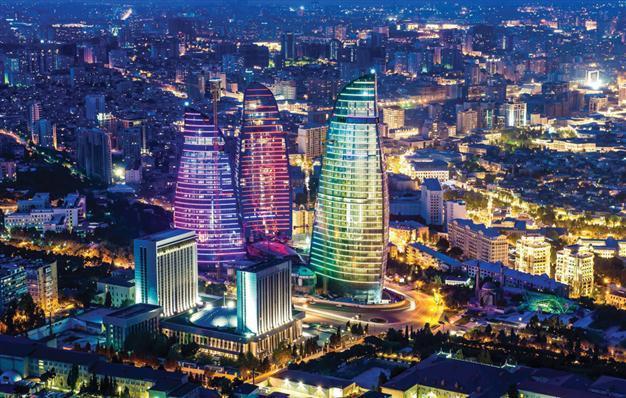Baku taking big steps in information technologies
Minister Ali M. Abbasov

A night view from the Azeri capital of Baku is seen in this file photo. The information technologies in the country are developing rapidly, Minister Abbasov says.
The Eurasian Economic Summit, taking place for the 16th consecutive year, could be seen as a continuation of the World Economic Forum held annually in Davos, Switzerland. Over the next 20 years, Eurasia’s economy will have a major stake in the world economy and cover 70 percent of the world’s population.What makes this gathering even more attracting is a growing influence of Turkey in global affairs both in economic and political terms in recent years. The new and contemporary development of the Turkish economy has been launched, and its borders spill over the world boundaries. Today, the Turkish economy is among the top 20 most-developed economies. The very fact that the 16th Eurasian Economic Summit is being held in Turkey echoes the country’s contribution to regional development.
Today, information and communication technologies (ICT) have marked social-economic development, and it has contributed to energy and security solutions, as well as has provided an ecological and live sustainability and turned to a main engine of the social and humanitarian changes.
With development of the ICT sector, specifically with the enhancement of the Internet, a virtual world has become as important as real life. There is even a serious shift to the growing importance of the virtual world. Digitalization of the economy, new relations that have been established based on social networks, growing penetration of ICT and as a result of the erosion of old, conventional borders change our perception of the future and life approaches.
In these realities, correct development of the ICT sector, provision of its accessibility to all layers of society, elimination of the digital divide between countries and social groups mark the importance of the solution of some vital problems.
Region lags behind in ITC sector
On the other hand, the Eurasian region, which is a main focus of this summit, is distinguished by its specific features. Today, our region lags behind in its ICT developments in comparison with the South-West and the Pacific countries. A vital issue for this region is development of the Internet as well as advancement of external connectivity. Other topics of concern are development of broadband connectivity and digital content’s enhancement. An application of ICT, as well as e-services, e-education, e-health and online banking are important issues. Equally vital is application of new models for Big Data, cloud computing and new grid resources, and enabling their joint usage. The region’s mountainous geography and harsh climate, poor infrastructure and anticipated growth of natural disasters force us to advance secure communications, including space communications.
2020 vision
In present days Azerbaijan is a country stepping in a new phase of development. As a country with huge proven reserves of oil and gas, Azerbaijan has new targets to achieve. Those are a shift to a new economy with the embracing of technologies and an elimination of the oil dependence severely. In the “Azerbaijan 2020: Vision into the Future” Development Concept, it is expected that within the next 10 years the country’s GDP’s non-oil sector part must be doubled. To reach this goal, there are important targets and assignments have been deployed to the ICT sector of Azerbaijan.
Today, the Azerbaijan ICT sector develops rapidly. Azerbaijan is the leader among the CIS countries in terms of Internet penetration. Currently, 70 percent of the country’s population has access to the Internet and 50 percent of them are broadband users. In the recent year, international Internet bandwidth capacities increased 2.2 times and the price dropped 35 percent. Currently, the cost of 1 Mbit/s of the Internet consists of less than 3 percent of the average salary. There is no license required for activities conducted over the Internet, online media, business etc. The Internet is not managed and regulated by the state at all. Ordinary subscribers, political parties, civil society and other NGOs’ initiatives such as Internet TV, radio programs and thousands of bloggers operate freely and openly in Azerbaijan. Only on the Facebook network, there are more than 1 million users and in terms of their engagement, Azerbaijan is among a handful of countries that have leading positions in Asia and Eurasia.
The mobile sector is rapidly developing too. Mobile phone penetration is 110 percent.
In 2012, fourth generation communication (4G) was deployed in Azerbaijan, making it the ninth country in Europe and 37th in the world that has shifted to the mentioned technology.
Minister of communications and information technologies of the Republic of Azerbaijan ALI M. ABBASOV.
















